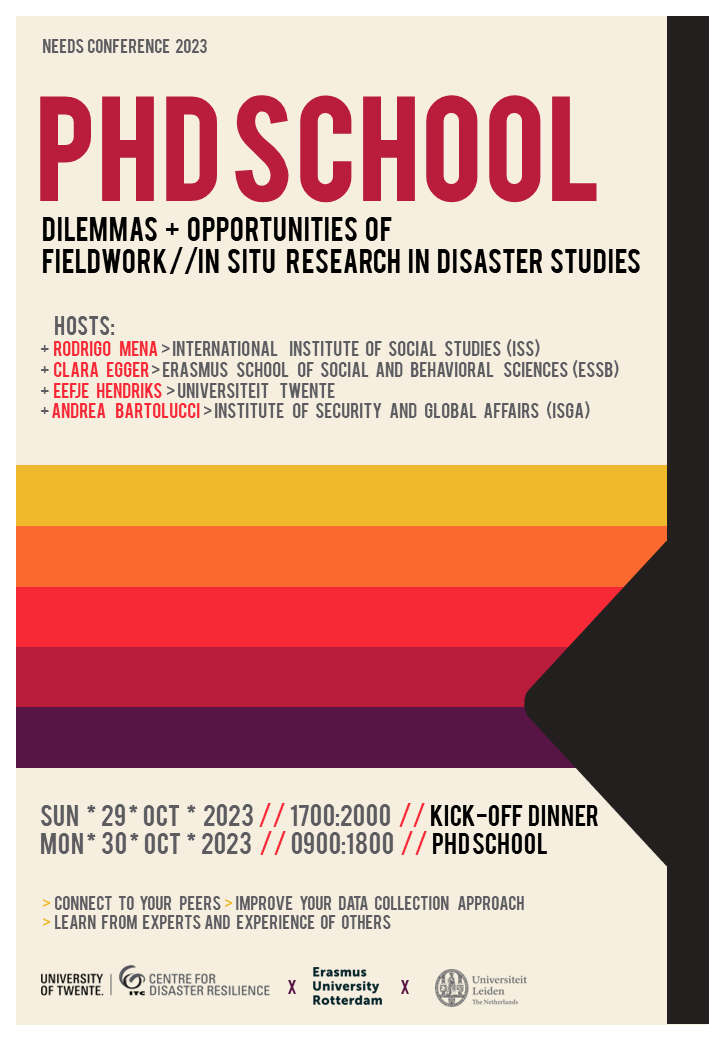
“Dilemmas and opportunities of fieldwork/in situ research in disaster studies”
Date:
- August 3 Selection of participants
- September 20, Online program explanation (14:00 - 15:30h)
- Friday 13 October, Submit a draft article for peer review
- Monday 16 October, submit peer review by participants and organizers
- Sunday 29 October, 17:00 - 20:00h, all participants are invited to an informal kick-off dinner at Paradijs
- Monday 30 October, from 9.00 to 18.00 PhD school.
School description:
In this PhD school, you will be guided to address dilemmas and opportunities that you might encounter in your fieldwork in a disaster related context. You will engage with an experienced team of researchers and connect to your peers to reflect upon your own research plans.
One of the core specificities of disaster studies is the importance given to fieldwork / in situ research as a data collection strategy. Research methods vary from one project to the next including, among others, ethnographic methods, participants or direct observation, qualitative interviews or experiments. Yet, all our studies run into specific ethical dilemmas for the research teams involved. Several dilemmas are common to all research endeavors, while others specifically concern disaster or disaster prone contexts.
For example, how can we ease power inequalities between research project stakeholders? How can we ensure that participants are not exposed to further risks due to their participation in the research? How can we give back to disaster communities after the end of the research? These are only a few questions that haunt researchers willing to engage in fieldwork in an ethically sound manner.
The aim of this PhD school is not to give simple answers to these challenging questions but rather to expose participants to relevant strategies to address such ethical dilemmas in the most reflexive manner. Through interactive workshops based on participants’ research projects, topics such as the ownership of the data, what moment is ethical, what ethical research means, how to operationalize it, how to make a risk assessment, and how to put ethical consideration in practice will be discussed.
Participants will be asked to share, before the PhD School, a two-pager presenting their research project and the way they intend to engage with fieldwork to address their research question. This initial paper will be peer-reviewed and form the basis of our conversation during the PhD school.
Learning outcomes
After the school, participants will be able to:
- Analyse the core ethical dilemmas of fieldwork / in situ research in disaster-prone contexts;
- Evaluate on how to engage best with fieldwork / in situ research in their own research project
- Reflect upon different strategies to strengthen inclusiveness in disaster research
- Have a stronger network in the field of disaster studies
Number of participants: Maximum 30 participants
Selection criteria and requirements:
- Conference participant for the NEEDS Conference 2023
- Relevance of the project as shown by a maximum of two pages presenting the research question, key elements of the theoretical framework and a research design showing a clear engagement with field/ in situ research
- Motivation letter stressing key expectations (one page max)
- Deadline is the 3rd of August at 12:00h (Central European Team)
In selecting participants, specific attention will be paid to ensure a representation of various disciplinary perspectives, gender as well as geographical backgrounds. The selection will be made on the 10th of August.
Costs
The PhD school is free of charge for the students selected. The school is sponsored by the University of Twente (Centre for Disaster Resilience), the Erasmus University and the University of Leiden.
Questions and contact details
Please write directly to the workshop organisers: needsconference@utwente.nl
